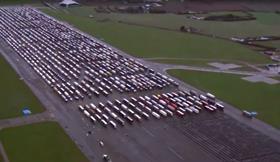
In response to the recent EU-UK border closures, industry association Freshfel Europe has called on the EU27 and UK authorities to ensure free movement of goods to and from the UK.
In a press release, the organisation said such action was in line with existing EU recommendations and guidelines, particularly regarding the implementation of EU Green Lanes and free movements of essential workers.
It will guarantee that essential perishable goods, such as fresh fruit and vegetables, can continue to cross the border, which will prevent distortions across the EU markets during the crucial Christmas period and ensure that sufficient supply of fresh produce can reach shelves in the UK, it said.
Freshfel Europe has been monitoring the situation at the EU-UK border closely since as an increasing number of EU member states closed their border with the UK in response to the emergence of a new Covid- 19 strain.
Port congestion in UK points of entry has already increased in the past few weeks due to the global trade slow-down resulting from the pandemic as well as the pre-Christmas period and no-deal Brexit fears.
Freshfel Europe warned that the newly imposed border closures were having a further impact on the flow of goods through the English Channel, with shortages of trucks and transport workers already being felt by the sector.
'This is a recurrent issue, which already strongly impacted the sector in March and April when the first Covid-19 wave hit Europe,' it said. 'This shortage has the potential to significantly distort the movement of European fresh produce to the UK at a crucial moment in the year.'
Freight between the EU27 and the UK follows a rotation system, so the blockage of EU-bound UK freight is affecting the rest of the chain and leading to higher costs for operators across the EU, as well as delays affecting the quality of perishable produce and order cancellations, the group noted.
'The blockage at UK-EU borders may also impact the capacity for intra-EU27 movements,' it added.
Whilst the sector supports the need to prevent the potential spread of the new Covid-19 strain, Freshfel Europe said it was urgently encouraging EU member states and UK authorities to follow existing EU guidelines and recommendations when implementing these new border closures and to follow a coordinated EU-wide approach.
'Freshfel Europe recalls the importance to ensure Green Lanes for the movements of essential goods within the Single Market (to which the UK is bound until 31 December) and to follow EU guidelines concerning the exercise of the free movement of workers as well as their welfare.'
It pointed to Council Recommendation (EU) 2020/1475 of 13 October 2020, which outlines a coordinated approach to the restriction of free movement in response to the Covid-19 pandemic.
The recommendation states that travellers with an essential function, such as transport workers, shall be enabled freedom of movement without undergoing quarantine while exercising this essential function.
Freshfel Europe also encouraged the EU27 and the UK to apply existing health protocols to guarantee the welfare of transport workers during the exercise of their duties when crossing the Channel.
'Additional measures to ensure their safety, such as the limitation of contacts during transit time, should also be swiftly implemented,' it said. 'Furthermore, EU and UK authorities should introduce urgent contingency measures to target the current bottleneck, such as additional ferry capacity, and increased speed for loading and unloading of freight in points of entry.'
Commenting on the high urgency to ensure EU-UK flows, Freshfel Europe general delegate Philippe Binard highlighted that, with Brexit imminent, limiting disruption across the Chanel by applying the tools and lessons learnt during the first wave of the pandemic in Europe was essential.
'EU Green Lanes,' he said, 'together with current EU guidelines and recommendations should enable Europe to have a coordinated approach to keep borders open for freight between the EU27 and the UK, as well as to guarantee the protection of transport workers performing this essential duty for the supply of the UK market and the integrity of the Single Market.'



